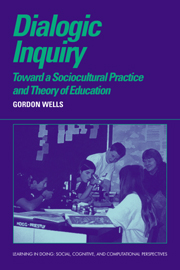Book contents
- Frontmatter
- Contents
- Conventions of Transcription
- Introduction
- Part I Establishing the Theoretical Framework
- 1 The Complementary Contributions of Halliday and Vygotsky to a “Language-based Theory of Learning”
- 2 In Search of Knowledge
- 3 Discourse and Knowing in the Classroom
- Part II Discourse, Learning, and Teaching
- Part III Learning and Teaching in the zpd
- Appendix I A Social Constructivist Model of Learning and Teaching
- Appendix II Categories for the Analysis of Discourse
- References
- Index of Authors
- Index of Subjects
- Title in the series
2 - In Search of Knowledge
Published online by Cambridge University Press: 09 November 2009
- Frontmatter
- Contents
- Conventions of Transcription
- Introduction
- Part I Establishing the Theoretical Framework
- 1 The Complementary Contributions of Halliday and Vygotsky to a “Language-based Theory of Learning”
- 2 In Search of Knowledge
- 3 Discourse and Knowing in the Classroom
- Part II Discourse, Learning, and Teaching
- Part III Learning and Teaching in the zpd
- Appendix I A Social Constructivist Model of Learning and Teaching
- Appendix II Categories for the Analysis of Discourse
- References
- Index of Authors
- Index of Subjects
- Title in the series
Summary
One of the central claims put forward in the language-based theory of learning proposed by both Vygotsky and Halliday is that the very same conversations that provide the opportunity for the child to learn language also provide the opportunity to learn through language. That is to say, by participating in the conversations that form part of most everyday activities, the child not only appropriates the culture's chief means of interpersonal communication, but also its ways of making sense of experience, as these are encoded in the discourse contributions of the coparticipants in those activities. As Halliday puts it: “language is the essential condition of knowing, the process by which experience becomes knowledge” (1993a, p. 94).
This is a strong claim and one that is clearly relevant to the ongoing educational debate about “educational knowledge” – what should be taught and how. However, what is surprising about this debate is how little attention is given to the nature of the knowledge over which there is so much disagreement. What does it mean to talk about either the “transmission” or the “transformation” of knowledge, and how are these processes achieved in the discourse, both spoken and written, which constitute the major forms of activity in classrooms at all levels from kindergarten to university. In this and the next chapter I want to explore these issues in farther detail.
As I shall argue below, knowledge construction and theory development most frequently occur in the context of a problem of some significance and take the form of a dialogue in which solutions are proposed and responded to with additions and extensions or objections and counterproposals from others.
- Type
- Chapter
- Information
- Dialogic InquiryTowards a Socio-cultural Practice and Theory of Education, pp. 51 - 97Publisher: Cambridge University PressPrint publication year: 1999



